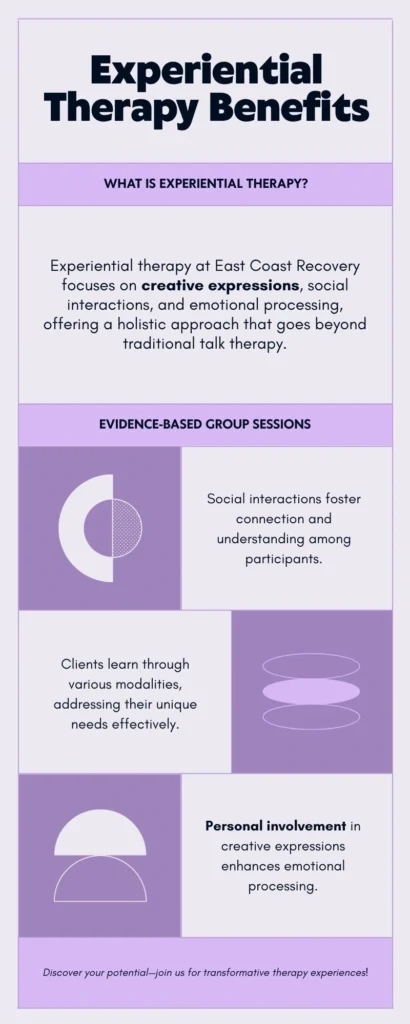At East Coast Recovery, we believe in treating the whole person, both mind and body, and that is why we rely on experiential therapy. These forms of group activities and experiences can help our clients explore their emotions, especially those that might be challenging or traumatic, in a more hands-on approach.
Using creative outlets, our experiential therapies can help you reflect on your emotions, grow as an individual, and develop coping mechanisms to better regulate emotions. But what is it, and what should you expect from experiential group therapy?
What is Experiential Therapy at East Coast Recovery?
Experiential therapy refers to a collection of therapies that focus more on your personal involvement in:
- Creative expressions
- Social interactions
- Emotional processing
Each facility offers a different collection of experiential group therapy sessions and hours that highlight some of the most evidence-based modalities, including nutritional counseling, yoga, mindfulness meditation, and art therapy.
There are a large number of experiential therapies, but at our facility, we focus on things that help you build meaning, improve your overall mental well-being, and proactively address things like your personal needs.
Beyond traditional talk therapy, we offer things like art therapy, mindfulness meditation, yoga, and other experiential therapies to address the different needs of each of our clients.

What to Expect in Experiential Group Therapy
We use a variety of activities and experiences to help you better explore your emotions and process things that may have contributed to your addiction or exacerbated your current symptoms.
Depending on the type of experiential group therapy session in which you participate, you can expect slightly different things like the following:
Active Participation
One of the main differences is the level of participation. Whereas a traditional therapy session might involve you sitting in a room and talking or even sitting in a group session and listening, our experiential group therapy sessions require more active participation, and that might be through our Adventure Therapy sessions, where you have to actively participate in our outdoor activities or the artistic endeavors of our art therapy sessions.
Homework and Skill Development
You will likely find that our experiential group therapy sessions involve more homework and skill development than might be expected in traditional settings. This can be true of things like cognitive behavioral therapy, where you might have to work on regular homework assignments in between sessions.
Reflection
Another thing to expect is a chance for reflection, and this is often guided by your therapist in things like yoga sessions or, in particular, mindful meditation. Our mindful meditation sessions are there to help you turn your attention inward, bring clarity to your mind, and connect more deeply with your emotions, including the difficult or negative ones.
Emotional Connections
With our sessions, you will have a chance for deeper emotional connections. For example, if you are uncomfortable with the idea of sitting in a room and sharing in a group setting, you might find that more creative outlets available through our art therapy can give you a chance to express yourself or better connect to your emotions without having to sit and talk. You might instead find this through yoga, where you might have to spend time getting to know your body and its connection to things like your breathing and your emotions.
Find Help at East Coast Recovery
Don’t wait to get help for mental health disorders like depression or PTSD or for addiction. With East Coast Recovery, we provide our clients with access to a range of experiential group therapy sessions designed to promote healing, encourage self-reflection, and build long-term coping skills for stability and sobriety.
Call us today at (617) 744-7373 or verify your insurance now.
FAQ
What is Experiential Therapy Used To Treat?
At East Coast Recovery, we use experiential therapies to treat addiction, mental health disorders, or the existence of both at the same time. Our experiential therapies can be used to treat depression, anxiety, PTSD, or bipolar disorder.
How Does Experiential Therapy Help Addiction?
With our flexible outpatient programs, clients can participate in several types of experiential therapies, including art therapy, narrative therapy, yoga, and mindfulness meditation. These are typically used in addition to traditional psychotherapy like ACT, DBT, and CBT.
There are many ways in which experiential therapy can help with addiction, including the building of social skills in group settings, the building of coping mechanisms on an individual level, helping overcome feelings of isolation or loneliness, and bolstering self-esteem. For those who don’t like interactions and traditional talk therapy, experiential therapy can provide an avenue for creative expression that is different and perhaps more comfortable.
Do I Only Get Experiential Therapy at East Coast Recovery?
Generally, no, as our experiential group therapy sessions are designed to be one part of your overarching recovery plan. Whether you are seeking treatment for mental health, addiction, or both, our experiential therapies can prove most useful when incorporated into other interventions like cognitive behavioral therapy.
What Are Expressive Therapies?
At East Coast Recovery, we offer several types of expressive therapies like narration and art therapy. These give you a chance to express yourself and reflect on your personal circumstances or struggles in a way that is different from traditional talk therapy. You might be able to narrate something from your life to help you resolve a psychological challenge or use art therapy to reduce negative experiences and let go of physical stress.
What is Adventure Therapy?
At our facility, we offer adventure therapy where you participate in outdoor events, things like expeditions, games, and similar challenges or opportunities. The purpose behind our adventure therapy is to help you develop trust with others, build your set of skills and thus your self-esteem, express yourself and communicate more effectively, and learn problem-solving techniques. All of these can help you sustain your recovery long-term.










